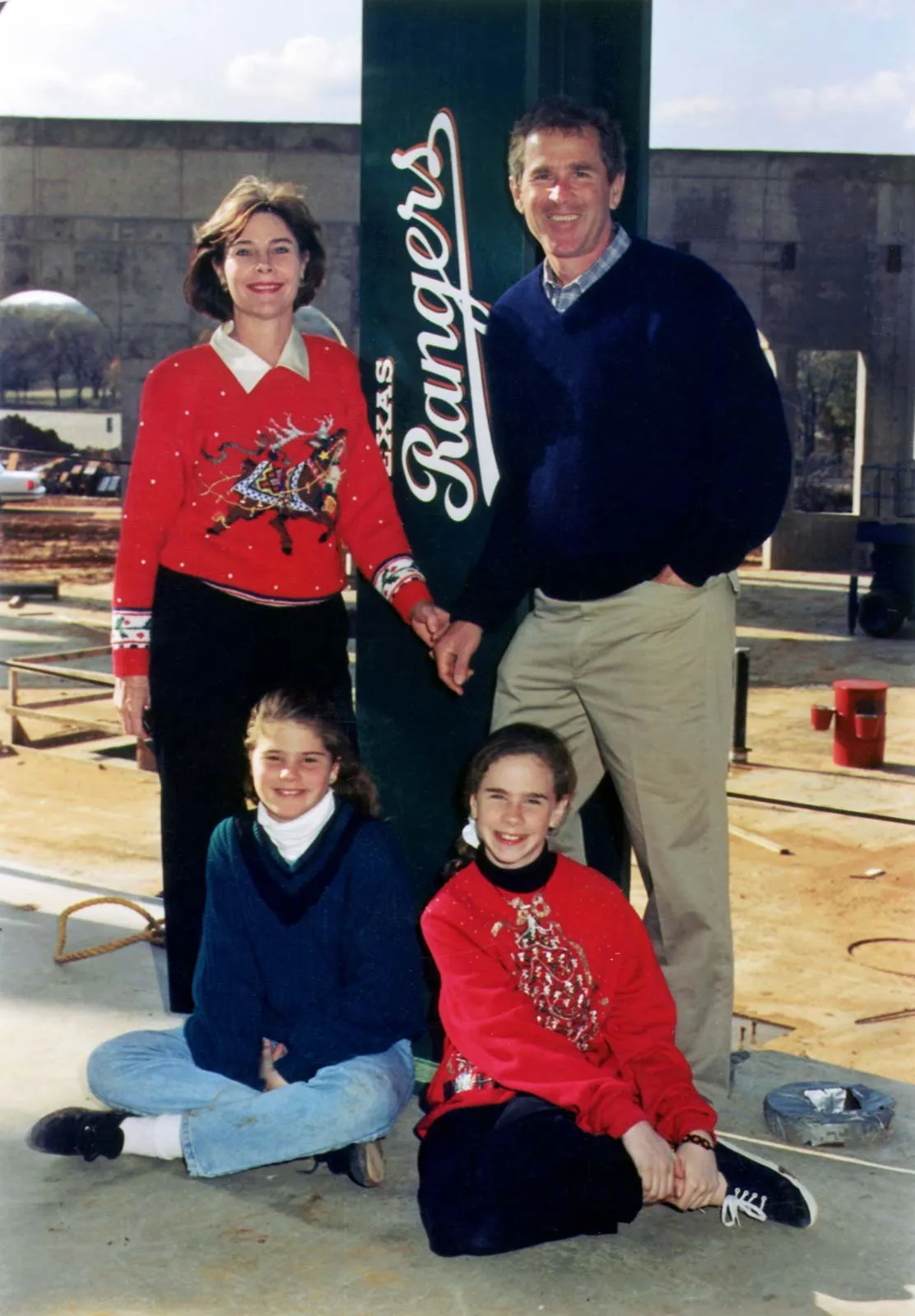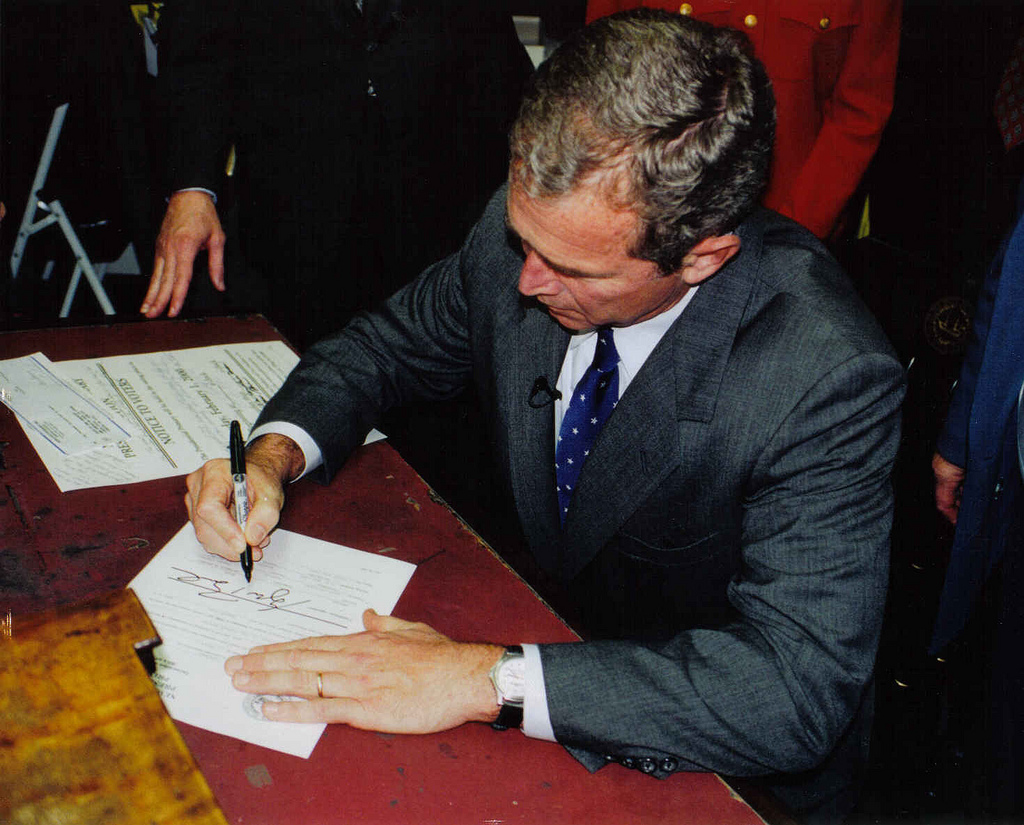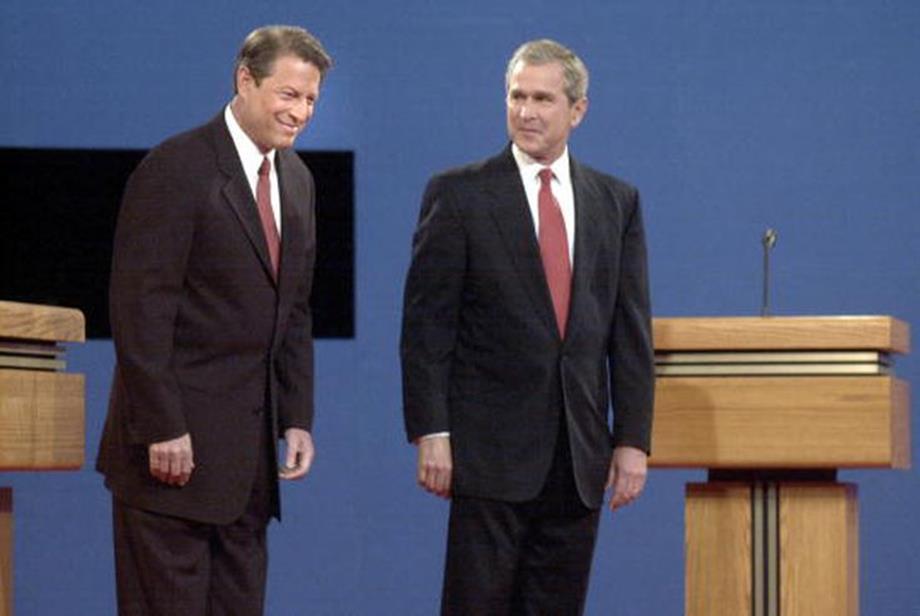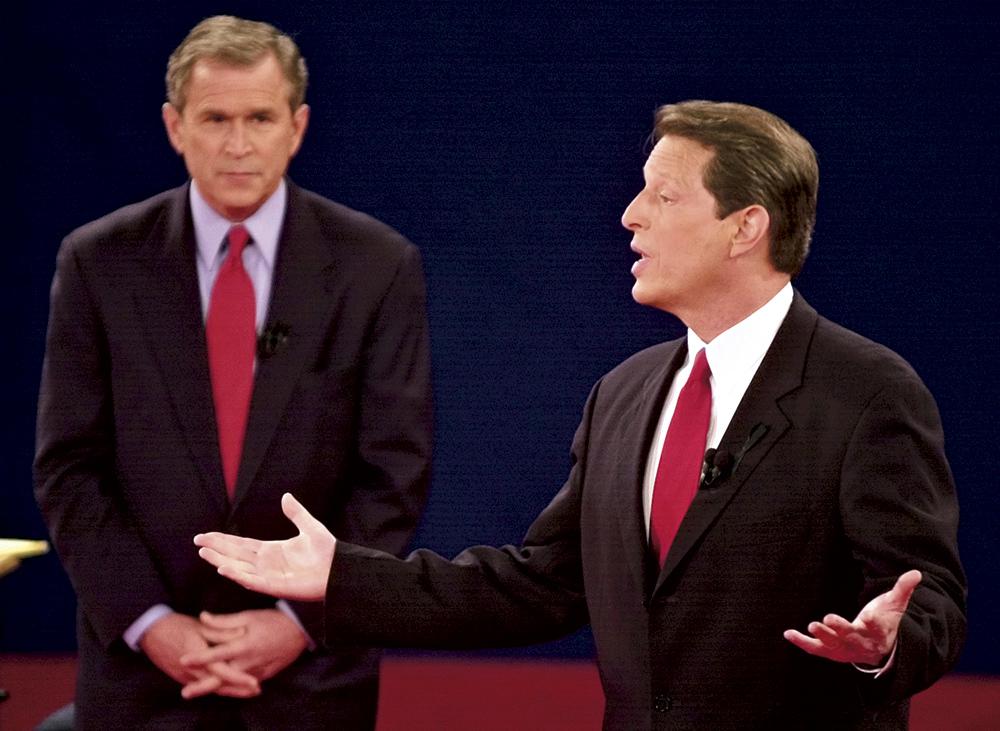26. BUSH (II) FUMBLES THE BALL

THE SECOND BOOMER PRESIDENT (AND SECOND BUSH)

THE SECOND BOOMER PRESIDENT (AND SECOND BUSH)
 Another Bush elected President –
Another Bush elected President –November 2000
 Bush's startup: educational reform (No
Bush's startup: educational reform (No
Child Left Behind or NCLB)
The textual material on this webpage is drawn directly from my work
America – The Covenant Nation © 2021, Volume Two, pages 342-348.
GEORGE W. BUSH (or "W") |
|
The closely contested 2000 presidential race
Both the Democrats and Republicans nominated for the presidential race of 2000 fairly young members of well-known political families: Gore and Bush. The Democrat Al Gore had been raised in a Washington political family (his father was a Senator from Tennessee) and he himself had served in the House and Senate since 1977 and had been Vice President all eight years of the Clinton presidency. George W. Bush ("W" in contrast to his father, "HW") had been a businessman (oil and baseball) and since early 1995 governor of Texas. It was an evenly matched race between the
nearly same aged (early 50s) Boomers, with Gore winning the popular
vote by a half a million votes but Bush narrowly winning the electoral
vote, by the U.S. Supreme Court stepping in after a very bitter recount
contest in Florida and finally confirming a very narrow Bush victory in
that state. Thus Bush would be the new president. Gore ultimately took
the loss rather respectfully when the matter became final (a
long-standing presidential tradition). What values did this second Boomer truly represent? Bush, Jr., was a figure hard to pin down as to his core political beliefs, not exactly unusual for a Boomer. He had a reformer's heart and announced that he was a born-again Christian and a "compassionate conservative." How that would shape his presidency was not quite clear.
|
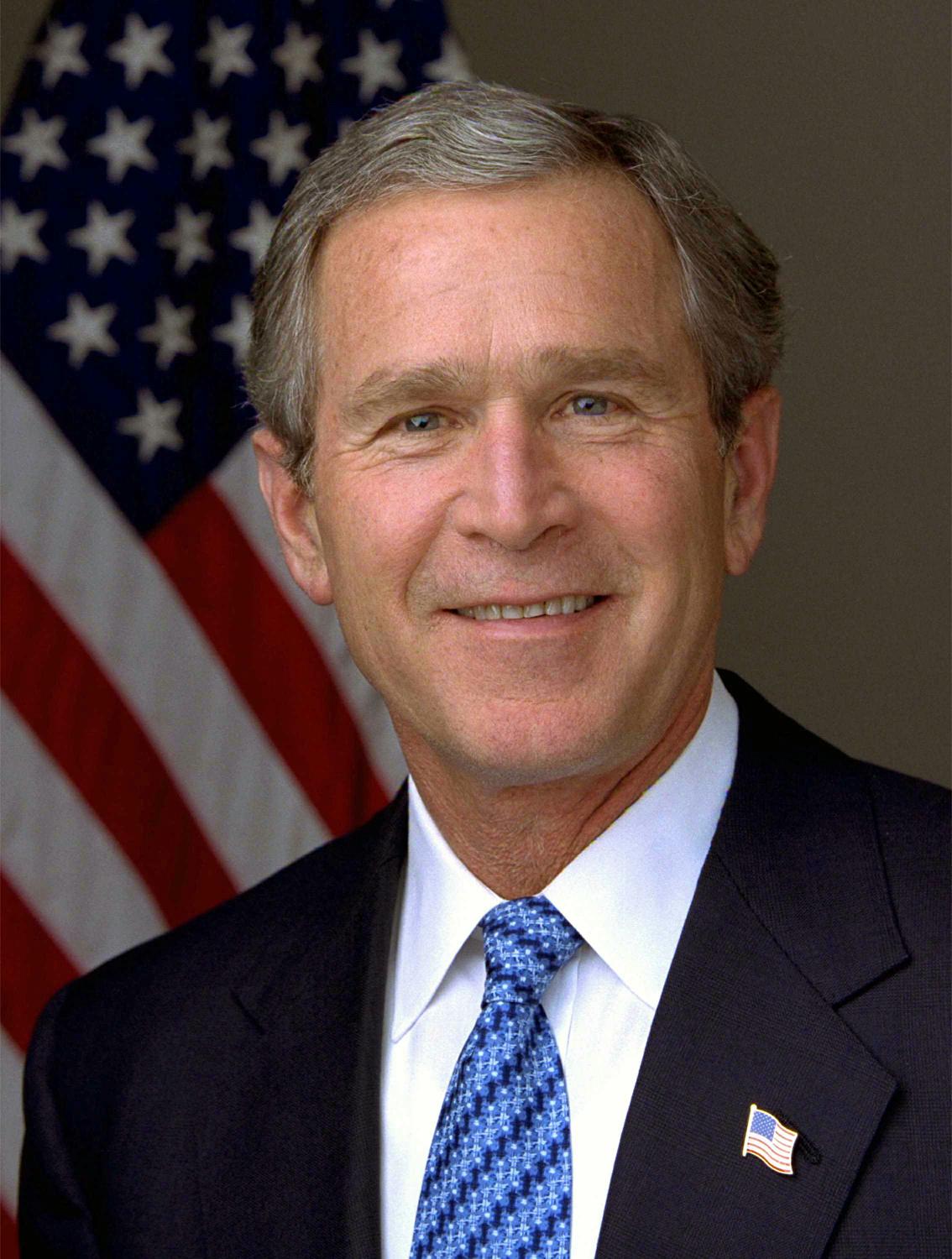
George "W" Bush, the man
Although Bush had been born to a prestigious
Eastern (Connecticut and Maine) family, his formation would be Texan,
through and through, something more closely resembling Middle America. We already know of his family background. And even though Bush, Jr. was raised a Texan, his path often followed that of his upper-class Easterner father, Bush, Sr. In fact, accepting that path, or rising above it or apart from it, would serve to challenge the younger Bush rather constantly. Bush, Jr., would always have the problem of the typical 2nd generation son, who had an ambitious, hard-working and highly successful 1st generation father to follow. "Privilege" would not always make for an easy life. It would always leave the haunting question to the son who had his own ambitions, who would wonder if it was on the basis of his own merits, or on the merits of his father, that he was experiencing success in life. Midland was a gritty Texas boom-town built on the oil business. The Bushes were there for exactly that reason, to develop the family fortunes in that same oil business. In this they succeeded handsomely. Religion played a key part in the structured family life that Bush, Jr., grew up in. His father taught Sunday School at the Presbyterian Church they attended, and the family's Christian faith needed to be called on when Bush's younger sister died of leukemia (Bush himself was seven at the time and, like his family, deeply stunned by the death). The Bushes eventually moved to the oil business's financial center, Houston, and here the family turned to the Episcopal Church for Sunday worship. When however Bush, Jr., was rejected in his application to study at Houston's prestigious St. John's School, he was enrolled instead in the even more prestigious Phillips Academy in Andover, Massachusetts, where his father and grandfather had studied – and acted as student leaders in their day. This would begin the process of Bush, Jr., moving forward on the basis of the social prestige that his family had developed in previous generations. Here at Phillips Academy, and Yale University afterwards, the social profile that would mark Bush, Jr. began to reveal itself. Perhaps part of this harkened back to his Texas days, but Bush preferred to play the role of a Texas "good old boy" rather than that of a polished up-East aristocrat or even scholar. Academically he found himself in the lower ranks of his class, but socially he was well-liked, actually considered by his peers as something of a leader. At Yale (entrance achieved through extensive family connections rather than through his uninspiring grades) he excelled at the party life, being a major fraternity boy, drinking, smoking, and dating the girls at the nearby girls' colleges. Thus partly on the basis of his social, not academic, skills, he was admitted to Yale's prestigious Skull and Bones society (as his father before him had been). Worship at Yale Chapel was simply not going to happen. It was directed by the Liberal activist Reverend William Sloan Coffin, Jr., for whom Bush quickly developed a general dislike, in the same way that Bush seemed naturally to dislike all such intellectuals, because of what he perceived as their inevitable tendency towards unwarranted arrogance, not to mention ill-founded social idealism. This was the era of very active civil rights campaigning and ultimately anti-war protesting on America's college campuses, Yale included, something that Bush had absolutely no interest in whatsoever. Texas had taught Bush some hard realities, ones that seemed to be entirely missing in what Bush perceived as the totally artificial world of up-East intellectualism. He would never get past that general view of intellectuals. He returned to Texas in 1968 after graduation, joined the Texas Air National Guard (again, pushed to the head of the long list of applicants because of family connections),1 and began his almost decade-long "nomadic years" as he termed them. He worked here and there at various jobs, and finally succeeded in 1973 in gaining entrance to Harvard Business School (thanks to his family's connections?) and gaining an MBA there in 1975. Even here in Cambridge, Massachusetts, he took on the same hard-drinking, good-old-boy (also politically quite conservative) profile, proving himself once again to be very popular on campus, even when he showed no interest in joining in the Boomer anti-Middle- America mood widespread on campus. He again returned to Texas and this time took up the family tradition of work in the oil industry – but on his own, forming his own oil and gas exploration company. In 1977 he met and three months later married Laura Welch, also of Midland (they had even been in 7th grade class together at one point). This would finally settle Bush down (somewhat) and they would find themselves attending church back and forth between her Methodist Church and the Presbyterian Church where Bush had once attended as a youth and now taught Sunday School. When then in 1982 their twin daughters were born and baptized in the Methodist Church, the entire family then made this their home church. Still at this point, Christianity was for Bush merely a place to find moral grounding. He valued the experience, but seemingly expected nothing more beyond that. And then the process of becoming "born-again" would begin, first with a meeting with traveling evangelist Arthur Blessitt in 1984 and then the following year with Billy Graham. At this point deep change gradually began to reshape Bush's life (daily reading of the Bible and Christian devotionals; no more alcohol, and eventually no more tobacco). He was even so closely identified with the evangelical community now that in 1987 he was assigned liaison work with evangelical ministries during his father's presidential campaign. This would further impact Bush, Jr.'s spiritual journey. Finally in 1989 he became a truly successful businessman, investing money from his oil business with a group who purchased the Texas Rangers baseball team. He subsequently became well-known as the team's "face" before the public (having a father as U.S. president was very helpful), and the sale of his interest in the team nine years later also would make him a multimillionaire. In 1994 he tried running again for public office (he had failed in gaining a Congressional seat back in 1978), this time for the position of Texas governor. He was up against the incumbent governor, progressivist Ann Richards, in a year in which the Democrats took a huge hit nationally. So also in Texas. He defeated Richards 53.5 percent against her 45.9 percent. His warmer personal style, family name, and just the general political atmosphere worked greatly in his favor. But he would be re-elected to the governor's office 1998 by an even larger majority of 69 percent, the first person in Texas history to achieve back-to-back electoral victories as governor! As Texas governor he had emphasized cutting taxes, improving education and advancing the status of minorities, especially Hispanics (he liked to demonstrate from time to time his Spanish language ability). But as a "compassionate conservative" (he coined this term while serving as Texas governor) he directed the Texas people themselves, not Texas state agencies, to look after the poor and the uneducated. His program was to set up faith-based (Christian) volunteer groups, partially supported in their work by public funding, to undertake the work of local social reform. Such citizen faith-based groups would eventually become the very central feature of his understanding of how government was supposed to work. But soon into his second term as governor, he made the decision to pursue the call to national presidency. As he saw things, it was a call that God himself had placed on his life. To gain the Republican candidacy, he emphasized his work as Texas governor in the field of education, and promised that as president he would rebuild the U.S. military, reduce taxes, and improve the status of the country's minorities. He was, he told the press, a compassionate conservative. The Republican field included a large number of candidates, quickly thinned down to just Bush versus John McCain, Arizona senator. The campaign against McCain got ugly. But Bush came out on top in the contest. As the Republican presidential candidate, he was now ready to take on the Democrats' candidate, Vice President Al Gore. Ironically, one of the main points on which he attacked the Democrats during the campaign was the incumbent Clinton-Gore Administration's huge involvement in "nation-building." Bush promised that he would involve the country in no more such costly and dangerous ventures. Ironically, this would soon come to be the all-consuming focus of much of Bush's presidency! Probably in the end most of the people who went to the polls to vote for him did so because he was the Republican candidate and because he was the son of a well-respected former American president. Otherwise there seemed to be very little differing the two candidates. Both ran as politically experienced "centrists." 1During his presidential campaign, his joining the Air National Guard was cast simply as a way of avoiding the draft – and dangerous military service, such as his opponent Al Gore had undergone. Maybe. But Bush actually proved himself to be an excellent fighter pilot in training exercises, though he never saw actual active duty. 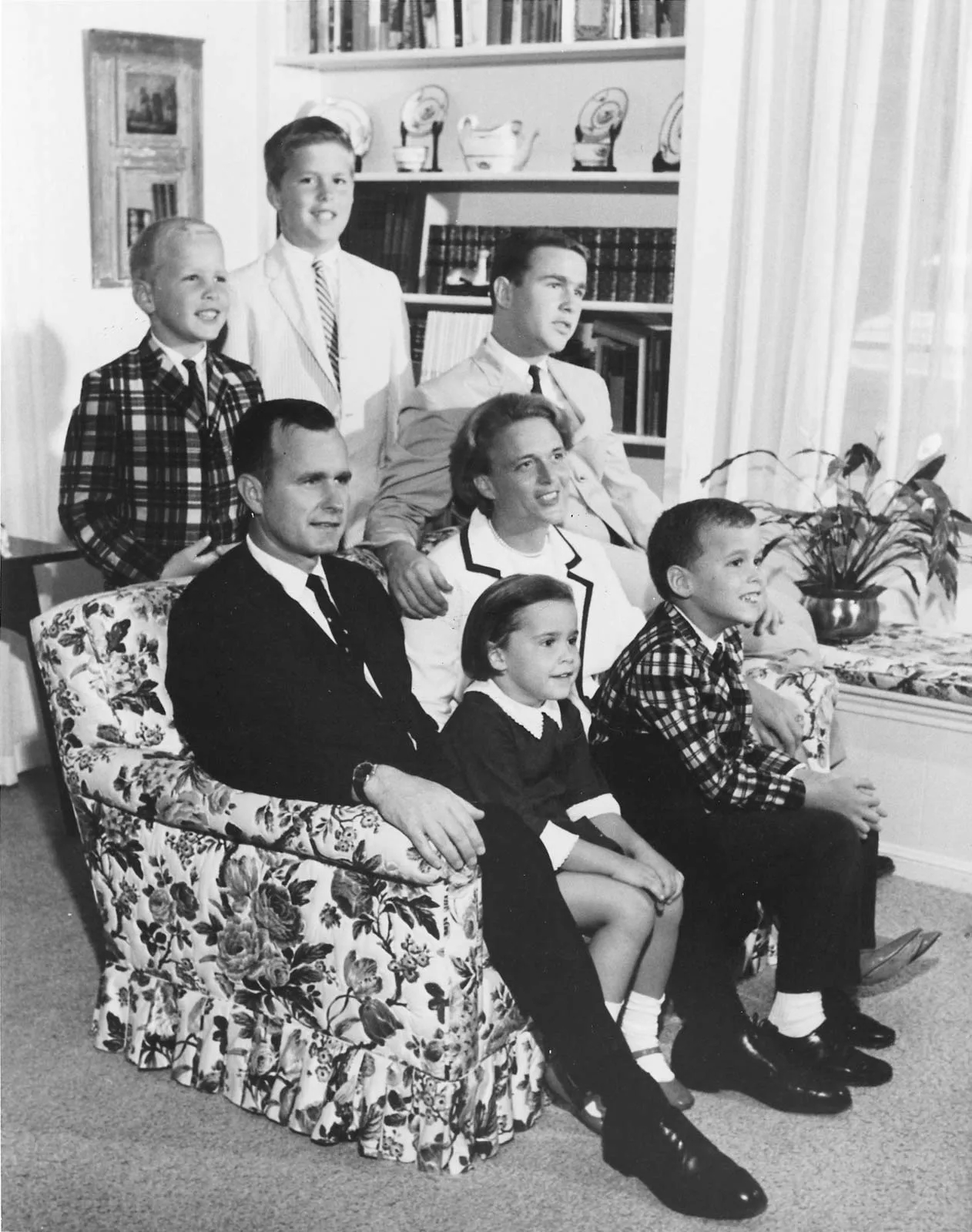 The Bush Family – Houston, Texas, 1964 "W" is seated on the arm of the chair; his brother Jeb (future Florida Governor) standing in the middle 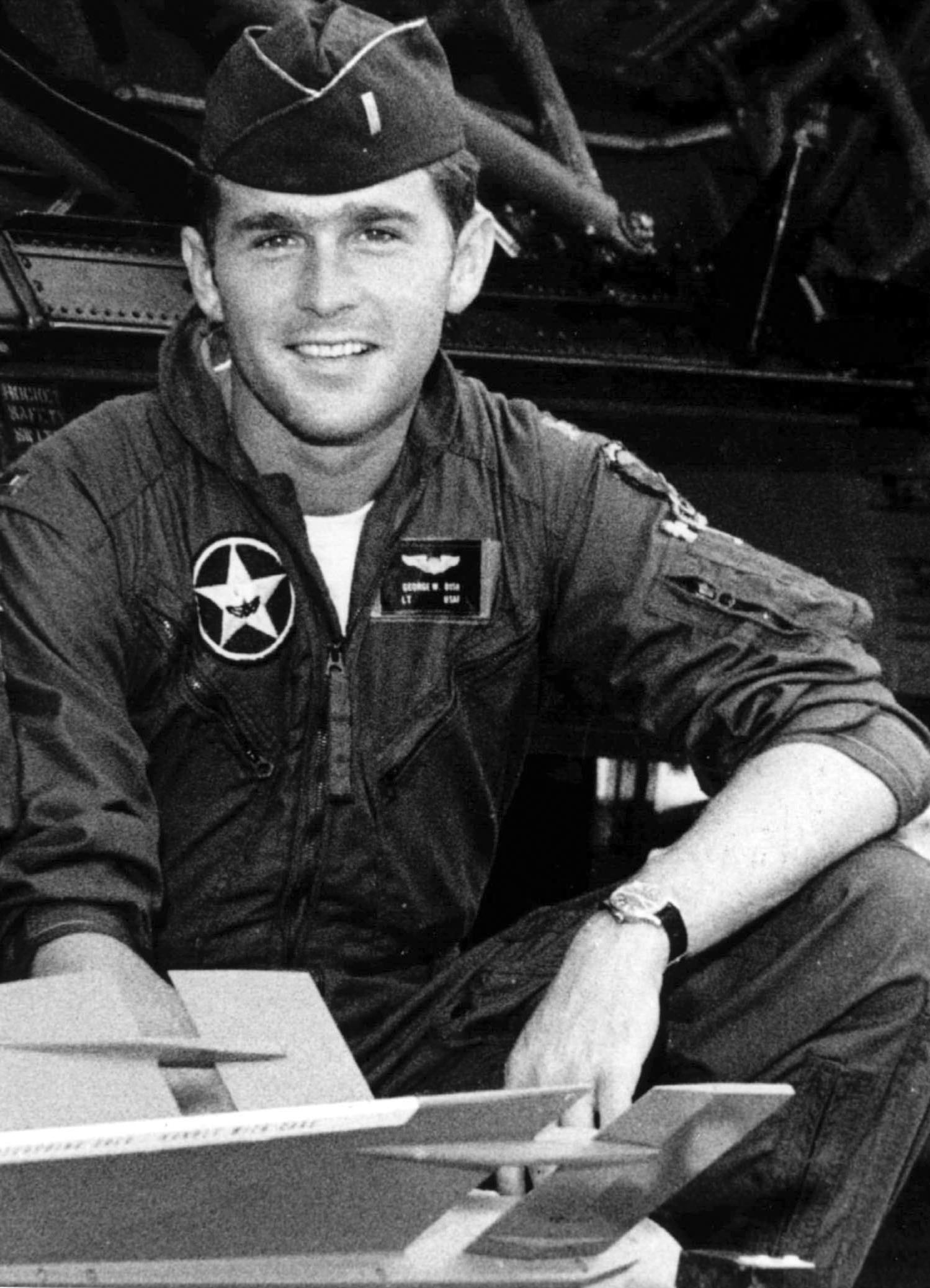
First Lieutenant George W.
Bush in the Texas Air National Guard. 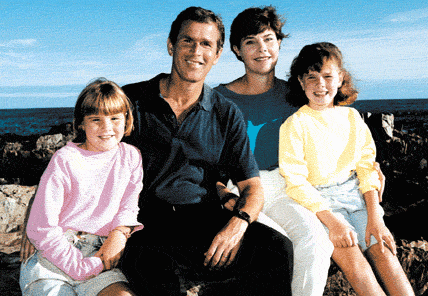
George W. and Laura Bush
with their daughters Jenna and Barbara, 1990
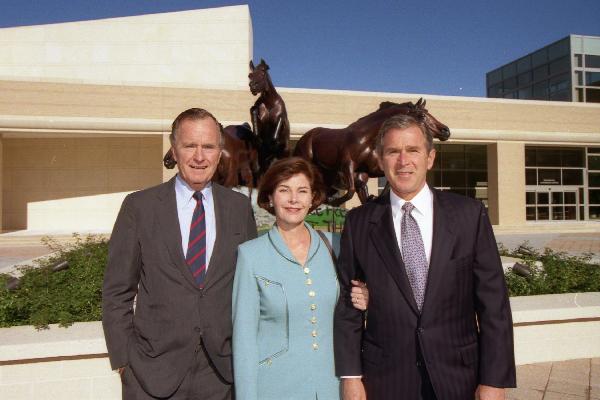
Former President Bush with
son and daughter-in-law, Governor George W and Laura Bush,
at the George Bush Presidential
Library Dedication in College Station, Texas – 6 November 1997 Bush in Concord, New Hampshire signing to be a candidate for president – 1999
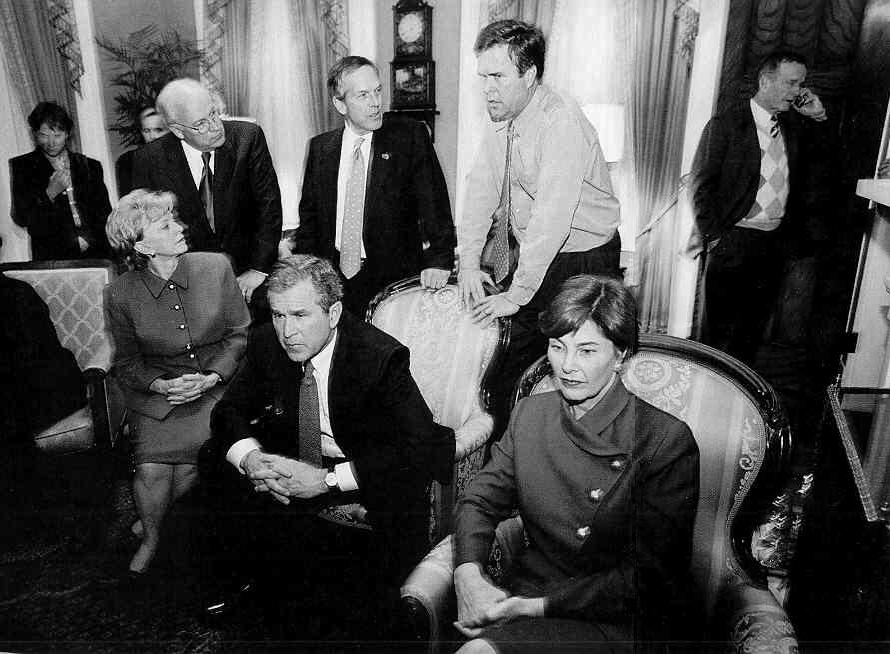
The Bush family awaits the election returns on election night – November 8, 2000 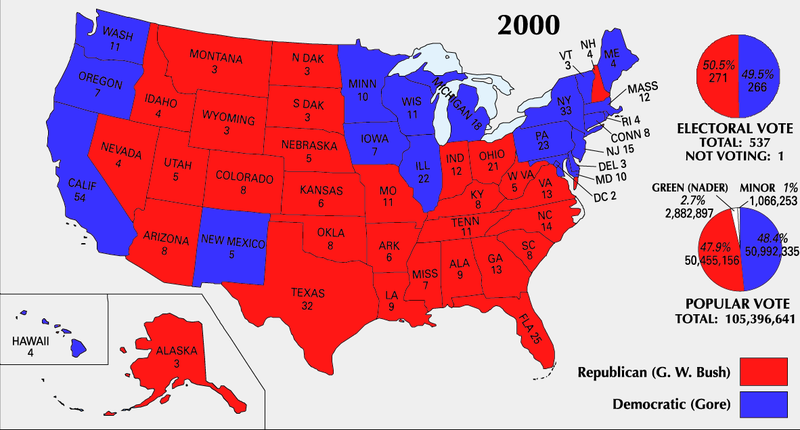
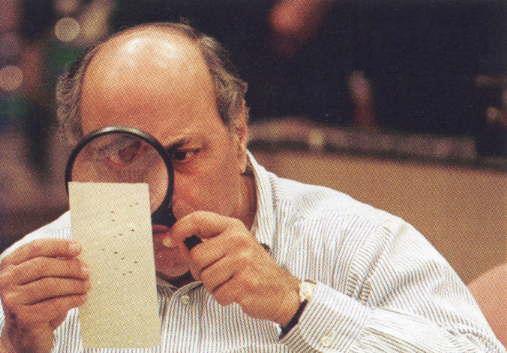
A heated dispute arises over the closeness of the vote in Florida – and a recount involves the close inspection of the "chad" ballots 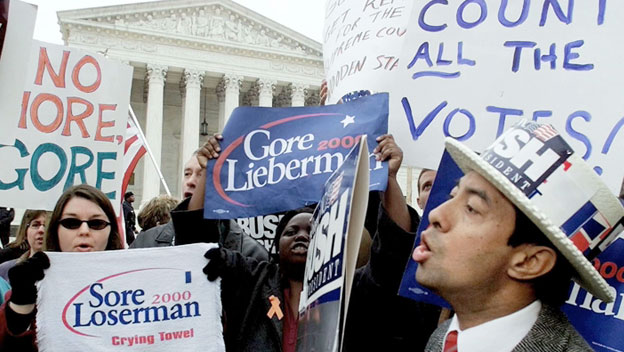
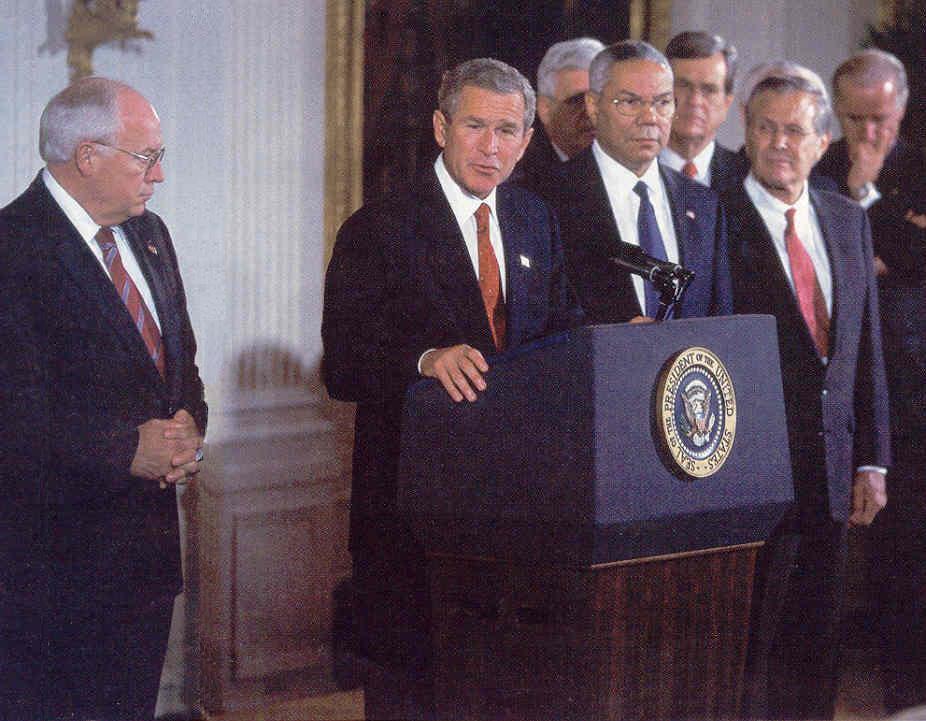 President Bush and part of his inner team: nbsp;Vice President Dick Cheney, the President, Secretary of State Colin Powell, and Defense Secretary Donald Rumsfeld 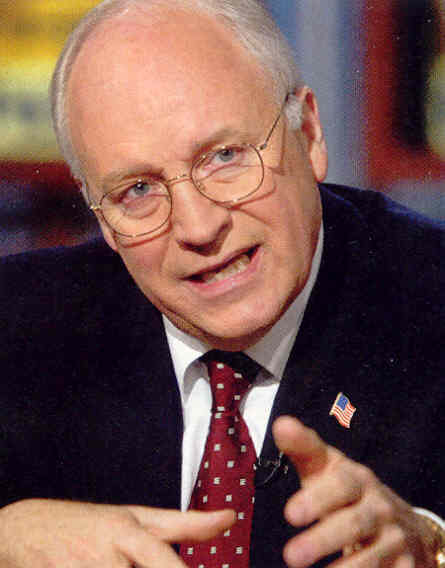
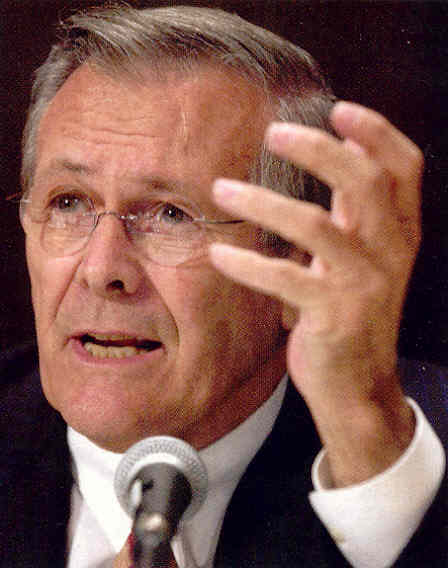
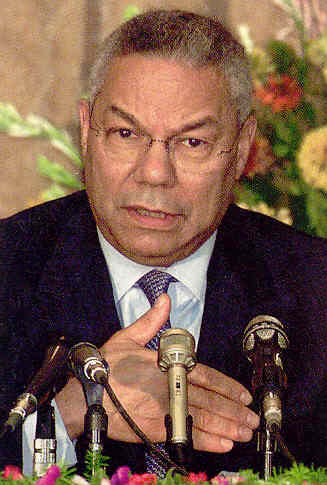
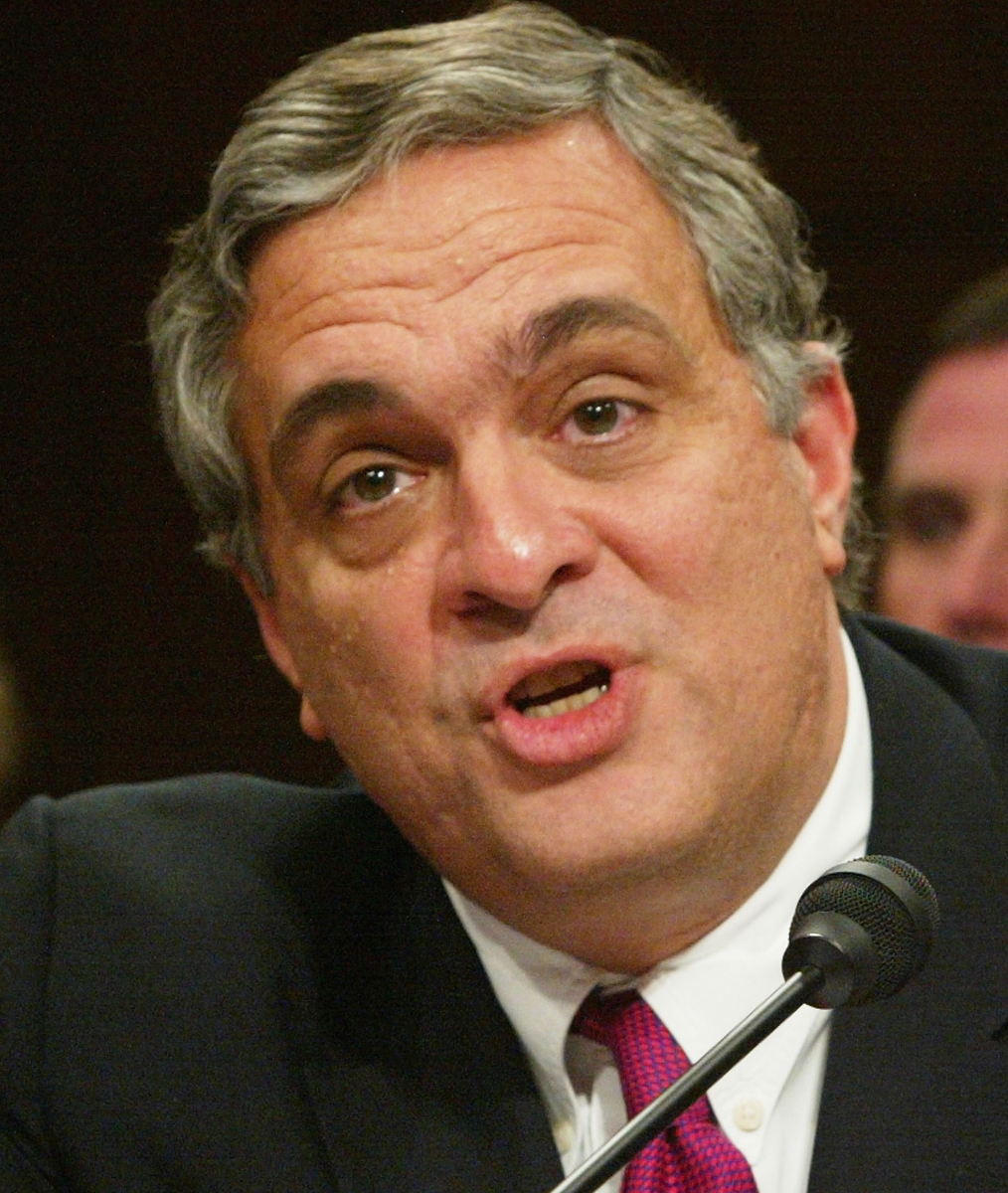 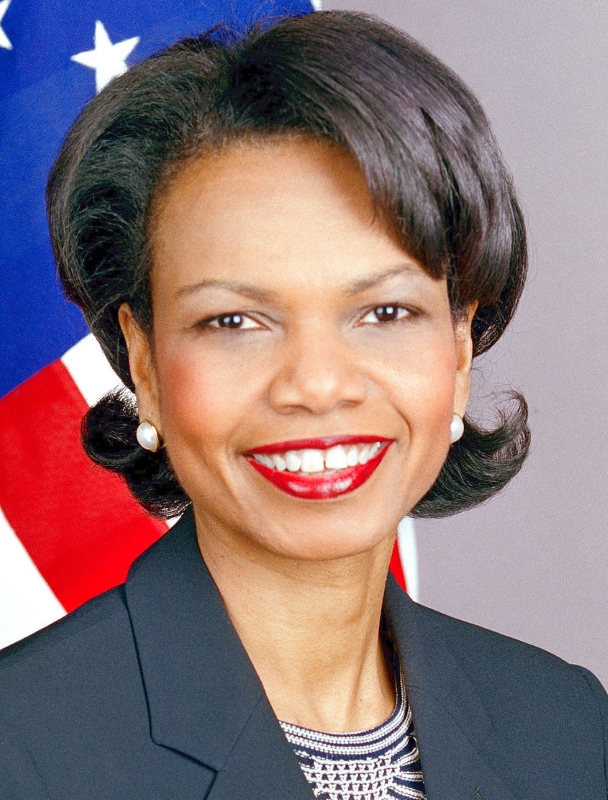
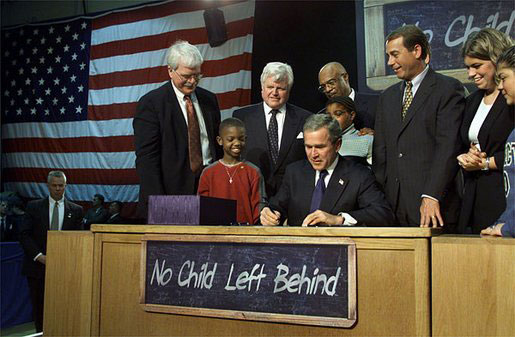
President George W. Bush signs into law the No Child Left Behind Act – Jan. 8, 2002
 Go on to the next section: 9/11 and the Search for Osama Bin Laden
 |

